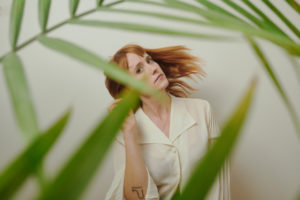Flock of Dimes’ “Two”
For anyone who has purposely cultivated their independence, especially in order to create in some way, shape or form, it can feel tenuous to want love. Those two things needn’t be at odds with one another, but oftentimes it can seem as though it’s a choice—either me or we.
Give too much to a partner and you’re left feeling divorced from your creative pursuits; give too much to your creative pursuits and your partner will, understandably, be hard pressed to stick around for very long. In matters of attention, there’s only so much to go around.
The desire for independence and companionship create a tension that’s not easily resolved. In Flock of Dimes‘ new song “Two,” Jenn Wasner questions whether a satisfying outcome exists. “Can I be one/ Can we be two/ Can I be for myself?/ Still be still with you?” Wasner sings on the chorus. I hear in that inquiry a plea of sorts—to keep the parts of herself that feed her creativity and her individualism, while still craving the beauty of companionship, of growing together with someone in a meaningful way.

“Two” signals a new direction for the Baltimore-born and Durham-based singer-songwriter, who has her hands in many musical pots these days. Beyond her solo project Flock of Dimes, she forms one-half of the indie rock group Wye Oak and wrapped up a touring stint with Bon Iver before the pandemic upended everyone’s plans. As Flock of Dimes, Wasner’s last full-length album came in 2016, but she released a gorgeous, and slow-burning EP Like So Much Desire last year. “Two” appears on her forthcoming album Head of Roses, out April 2.
Melodically, “Two” stretches Wasner’s craft. The song is richly textured, weaving together upbeat, almost-plucky synths with long, luxurious guitar in ways that mirror the song’s query about wanting two things that don’t fit neatly into the same frame. That everything works so well together instrumentally, in a sort of indie-rock-meets-electro-pop-giddiness, signals to the possibility of something larger. Rather than shrinking into categories of ‘either/or,’ there can be room for ‘and’—or at least, for now, the dream of it.




